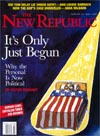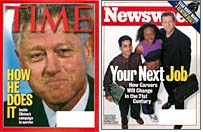
Economist, Jan. 30
(posted Saturday, Jan. 30, 1999)
The cover editorial predicts the imminent collapse of--guess what?--massively overvalued Internet stocks. That crash, if it doesn't drag the whole stock market down, could be useful for the economy because it will "restore sanity" to the venture capital industry. Some of the big Internet pioneers such as Yahoo! and America Online may survive, but the Dollar.coms and Buy.coms of the world are surely doomed. ... An article identifies four reasons that company managers are rich yet miserable: 1) They're working longer hours. 2) Flatter management structures diminish the sweet sense of victory that used to come from reaching the top. 3) Job paranoia: Execs get fired more often these days. 4) Outside contractors are increasingly siphoning power from managers' "fiefdoms." ... An article finds "feminism" in an unexpected place: primitive, forest-dwelling tribes. The women are deliberately promiscuous in order to win more male protectors for their child. Men, not knowing if they're the biological father or not, assume that they are.

New Republic, Feb. 15
(posted Friday, Jan. 29, 1999)
The cover story argues that feminists and evangelicals are to blame for the increasingly blurry line between private morality and public life. Both these newly enfranchised groups emphasize conversion and consciousness-raising, and insist that the personal is political. ... The editorial deplores the resignation of a white Washington, D.C., mayoral aide for uttering the word "niggardly" in a financial management meeting. The word has no etymological connection to the racial slur, but new Mayor Anthony Williams yielded to the mere appearance of bias instead of defending his staffer. ... A piece accuses House Majority Whip Tom DeLay of tap-dancing around the truth in a now-settled 1994 lawsuit. Accused of using a private company to carry his campaign loans, DeLay had trouble affirming or denying his connection to the business, answering with Clintonesque equivocations.

New York Times Magazine, Jan. 31
(posted Thursday, Jan. 28, 1999)
The cover story examines the decline and fall of the Italian Mafia, and the Gambino family in particular. The wiser of the wise guys have gone legit; the dumber ones (such as John Gotti Jr.) preside over sagging profits and faltering allegiances. Gotti has even tarnished the mob's Coppolaesque grandeur. The piece mocks his car (a minivan), his attire (mock turtlenecks), and choice of repast (country-fried steak). ... A writer finds great disparities among the different bilingual education classrooms of a New York City public school. The Chinese and Russian programs provide a fluid, supportive transition to English. But Hispanic students, for whom bilingual education was originally designed, languish in a "well-upholstered trap."... A newbie foreign correspondent describes his training at "hostile environment school," where journalists learn to dodge bullets and placate their kidnappers. ... The magazine gives Bill Murray its now-standard Hollywood profile treatment: He's not just a funny guy who makes funny movies. No, he's a fiercely independent artiste with a secret cerebral side who takes long road trips in beat-up vehicles. Just like Sean Penn.

Time and Newsweek, Feb. 1
(posted Monday, Jan. 25, 1999)
The magazines do the math on the State of the Union address. Time's cover story details the president's soaring poll numbers and the various boosts they've given to his lawyers' confidence, his relationships with Congress, and even to donations to the Democratic Party. Newsweek calculates the bottom line on the president's plan to save Social Security: It promises away a full 151 percent of the projected budget surplus, and would create a shortfall of $2.3 trillion. ...Time calls Bill Bradley's nascent presidential campaign strategy "charming" and "insane." In contrast to the well-oiled Gore machine, Bradley has no staff, message, money, or following. The piece features what is sure to be a major element of any Bradley run: a surfeit of tired sports metaphors. ...Newsweek's cover story says the labor shortage is emboldening and transforming the American work force. The Company Man has been replaced by a fiercely independent gang of "free agents," "new nomads," and "globalists," who write their own job descriptions, schedules, and rules. But Time suggests that even these bold quasientrepreneurs need to commiserate around the water cooler. It profiles a new kind of office superstore-cum-hotel that sells generic office space to lonely telecommuters. ... A Newsweek piece describes (and amply illustrates) how the men's magazine Maxim is stimulating the Playboyization of the genre. Competitors disdain its lowbrow tone but nurse a bad case of circulation envy.

U.S. News & World Report, Feb. 1
(posted Monday, Jan. 25, 1999)
The annual Mutual Funds issue congratulates the aggressive and chastises those cowed by short-term fluctuations. Index funds top the lists, while money market accounts lag behind. ... A piece argues that governors' offices are replacing the federal government as the primary engine of domestic policy. In contrast to trial-blinded Washington, states are using their newly bulging coffers to reform education, health care, and Social Security. ... The magazine recounts Fidel Castro's epistolary romance with a Havana socialite: Imprisoned after his failed 1953 coup, he sent her fervent letters that mixed political invective with sweet nothings ("there is a type of honey that never satiates").

The New Yorker, Feb. 1
(posted Monday, Jan. 25, 1999)
An article says that Mongolia is clogged with a "glut of raw cashmere": Fresh-off-the-goat cashmere fetches a rock-bottom price worldwide, as supply has skyrocketed (thanks to capitalism, the number of goats in Mongolia has doubled since 1992). Since raw cashmere is sold by weight, some suppliers turn to dirty tricks, like plugging factory-bound cashmere tufts with heavy dirt. So choose carefully among those thousand dollar sweaters dangling in upscale SoHo stores. ... A gripping article describes why the potential for surgical error is so high. Surgeons are human, forced to make split-second choices about conditions they may never have seen before, and operating on the human body is not a machine-reliant science such as flying an airplane. Demonizing errors, the author argues, dangerously hinders constructive discussion about those errors.

Weekly Standard, Feb. 1
(posted Monday, Jan. 25, 1999)
The editors offer their own diagnosis of the state of the union. It must be awful, they argue, if the president's lawyers have succeeded in feeding a dubious and duplicitous defense to the Senate, the public, and the press. ... Two other stories, however, are premised on the nation's general success and contentedness. The cover story explains that morality is no longer about a pre-formed set of abstract values. Instead, moral standards fluctuate like stocks, rising and falling according to the practical results they yield. Examples: Americans value chastity because it prevents AIDS, temperance because it's healthy, and marriage because it produces well-adjusted children. ... A piece gleefully imagines what will happen to President Clinton's popularity in a future economic downturn. A slump will expose his "disgusting betrayal of Democratic principles" and finally cause his supporters to jump ship.